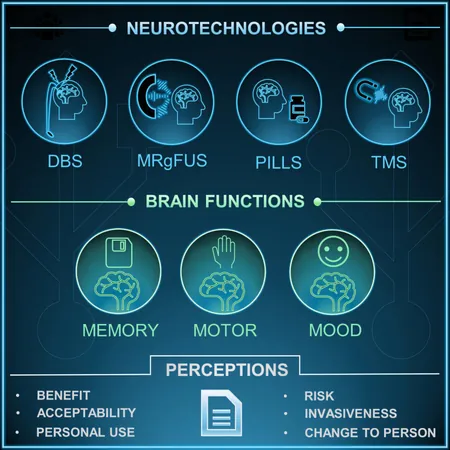
Unveiling Public Perceptions of Neurotechnologies: How Open Are We to Brain Treatments?
2025-05-26
Author: Wei
As brain-related conditions on the rise, understanding how the public perceives neurotechnologies aimed at treating them is crucial. A new study sheds light on this topic, revealing intriguing insights into potential patient willingness.
Navigating the Neurotech Landscape
Published in the journal *Device*, this study surveyed over 1,000 U.S. adults, diving deep into public sentiment about four prominent neurotechnologies designed for serious mood, memory, and motor issues. The research was part of the Neurotech Justice Accelerator initiative at Mass General Brigham, aiming to enhance understanding of public opinions on emerging neurotechnologies.
Comparing Treatments Head to Head
Unlike previous studies that focused on individual treatments, this research compared four options directly: deep brain stimulation (DBS), MRI-guided focused ultrasound (MRgFUS), transcranial magnetic stimulation (TMS), and standard medications like pills. Participants evaluated these technologies on their perceived benefits, acceptability, and risks, as well as their potential to affect personal identity.
Insights from the Survey
Results revealed that while general knowledge of these technologies was low, interest in them increased when facing severe symptoms. Notably, pills emerged as the most favored option, with 61% of respondents willing to consider them. TMS followed at 41%, MRgFUS at 29%, and DBS at 21%.
The Risk-Reward Balance
DBS, while deemed beneficial, was viewed as invasive and risky—causing hesitation among potential users. Interestingly, perceptions varied significantly based on the type of symptom being treated. Motor symptom treatments were more favorably rated compared to mood disorder interventions, which were often seen as more intrusive.
Delving Into Deeper Concerns
This study underscores that public hesitance isn't solely about the technologies themselves; it intertwines with deeper beliefs regarding mental versus physical health. This understanding is pivotal for enhancing communication about neurotechnological interventions and ensuring ethical applications in clinical settings.
Looking Forward: What’s Next?
With these findings as a foundation, the researchers plan to delve deeper using network analyses to explore how these perceptions interact and influence openness to neurotechnologies. This exploration aims to foster the ethical development of brain treatments that resonate more closely with patient values and needs.



 Brasil (PT)
Brasil (PT)
 Canada (EN)
Canada (EN)
 Chile (ES)
Chile (ES)
 Česko (CS)
Česko (CS)
 대한민국 (KO)
대한민국 (KO)
 España (ES)
España (ES)
 France (FR)
France (FR)
 Hong Kong (EN)
Hong Kong (EN)
 Italia (IT)
Italia (IT)
 日本 (JA)
日本 (JA)
 Magyarország (HU)
Magyarország (HU)
 Norge (NO)
Norge (NO)
 Polska (PL)
Polska (PL)
 Schweiz (DE)
Schweiz (DE)
 Singapore (EN)
Singapore (EN)
 Sverige (SV)
Sverige (SV)
 Suomi (FI)
Suomi (FI)
 Türkiye (TR)
Türkiye (TR)
 الإمارات العربية المتحدة (AR)
الإمارات العربية المتحدة (AR)